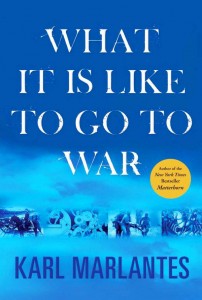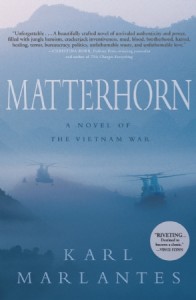Karl Marlantes: What It Is Like to Go to War
October 2, 2011 by David
Filed under Non-Fiction, WritersCast
 978-0802119926 – Atlantic Monthly Press – Hardcover – $25.00 (e-book and audiobook editions available)
978-0802119926 – Atlantic Monthly Press – Hardcover – $25.00 (e-book and audiobook editions available)
I read Karl Marlantes’ novel, the extraordinary Matterhorn last year (and interviewed him about it for Writerscast – you can listen to that interview here). I don’t think I am alone in believing that Matterhorn is perhaps the finest and most important war novel of the Vietnam generation; for me at least, it belongs in the pantheon of great American war novels (going back to WWI, Thomas Boyd’s Through the Wheat is another great novel written by an former Marine).
It took Karl Marlantes more than 30 years to write and publish the novel we read as Matterhorn its final form. His new book, What It Is like to Go to War, now follows as a deeply thoughtful and moving work of nonfiction about the nature and meaning of war, and what it means to the individual warriors who participate who fight, as well as to the society that gives them that responsibility.
There are many parallels between the two books. I’d recommend you take on the novel first, spend some time thinking about its story and characters, and then move on to this new work of nonfiction, which is a combination of personal memoir, meditation and social, political and cultural analysis and polemic.
Insofar as fiction gives us our deepest emotional and spiritual truths, Matterhorn cannot fail to move you and allow you to feel the reality of what it is like when our best and brightest go to war. Then What It Is Like to Go to War gives us another carefully wrought perspective, what Marlantes has learned from his own experiences and from many years of studying and thinking about war and society.
And we should all be paying attention to what he says here. America has had more people fighting wars for a longer period of time than at any other time in our history. Indeed what does this say about contemporary American society?
In 1969, when he was just 23, Karl Marlantes was an inexperienced lieutenant in charge of a platoon of Marines whose lives were in his hands. His experiences in the jungles of Vietnam , molded and shaped him throughout his life. He has thought deeply about his wartime experiences, how they affected him and his comrades, as well as how other soldiers before and since have gone through similar experiences. In What It Is Like to Go to War, Marlantes weaves accounts of his own combat experiences with analysis, self-examination, and powerful ideas drawn from his wide reading from Homer to the Mahabharata to Jung.
Unlike many of us who feel that war must be ended in modern society, Marlantes starts from the belief that war is an inevitable component of societal and political being. What he is after is to make us think about preparing warriors not for fighting, which we already do quite well, but for living with the effects on those who go to war that derive from participating in the morally unnatural but societally sanctioned acts of killing other human beings.
Most societies that preceded us have used powerful rituals, myths and ceremonies to integrate acts of war into the fabric of their cultures, and to reintegrate their warriors thoroughly into their societies, while our secular, materialist society really offers no tools or methods to warriors (or for that matter to civilians) to create a holistic “story” of why and how war is meaningful and necessary.
One of the many points he made in this book really struck me is that those who send men and women to war are themselves warriors, that actual soldiers (as opposed to guns and bombs) are their weapons. These individuals must fully comprehend what they do, and must find ways to integrate their own acts of war as much as the soldiers on the battlefield who wield the weapons and who witness so much death and destruction on both sides of battle.
I found that the author’s afterword to the book was very important to my understanding and acceptance of his work:
“We must be honest and open about both sides of war. The more aware we are of war’s costs, not just in death and dollars, but also in shattered minds, souls, and families, the less likely we will be to waste our most precious asset and our best weapon: our young.”
“The substitutes for war…are spirituality, love, art, and creativity, all achievable through individual hard work.”
I can’t recommend this book to readers enough. It’s book that, like the work of my friend, Paul Chappell, (Will War Ever End and The End of War) has the potential to shift our societal dialogue about war and what it can and should mean to a modern society.
There’s a fine review of What It Means to Go to War in the NY Times and a very worthwhile interview with Karl on Livewriters about Matterhorn.
Podcast: Play in new window | Download
Tatjana Soli: The Lotus Eaters: A Novel
June 4, 2010 by David
Filed under Fiction, WritersCast
 978-0312611576 – St. Martin’s Press – Hardcover – $24.99 (also available as an e-book)
978-0312611576 – St. Martin’s Press – Hardcover – $24.99 (also available as an e-book)
I know I am not alone having read both Tatjana Soli’s The Lotus Eaters and Karl Marlantes’ Matterhorn – they are unavoidably linked as both are set in Vietnam during the American war. Of course they are incredibly different in outlook, approach and story, but reading them together is a wonderful experience. As Writerscast listeners know, I loved Matterhorn – I do think it is the great novel of the Vietnam War that we have been waiting to experience for several decades.
At the same time, Tatjana’s novel is simply remarkable. She writes beautifully, inhabits her characters, their place and time, their suffering, challenges and transcendent moments. As she told me in her interview, she fell in love with the Vietnam of that era from afar, and learned everything she could about it in order to be able to write this story. Her main character is a young photographer, Helen, who comes to Vietnam early in the war, mainly because her brother died there, and she is drawn to the place where he lost his life, to figuratively solve the mystery of his death. But that is just the beginning of her journey. The war, the soldiers and other journalists, and the people of Vietnam overtake her. She becomes deeply connected to this place and time. Soli brilliantly portrays the landscape and the people of Vietnam, the suffering and horror of a seemingly endless war, and the way that war overtakes every element of human and natural life.
Helen falls in love with another photographer, Sam Darrow, a grizzled veteran who teaches her how to cope with war, survive, thrive, document, participate, suffer and love the danger and energy of men at war. But the truest, and deepest story is her love for Linh, an exceptionally complicated Vietnamese former soldier, who has gone to work for the American news agency Helen works for. At the end of the book, which thankfully avoids the cliched approach of much modern fiction, Helen and Linh journey out of Vietnam through Cambodia, an even more horrendous landscape of death and together find their way to safety, a harrowing journey that mirrors where they have traveled emotionally through the course of the novel.
A woman among men sees war more clearly than most, I think; in this book, that vision focuses and transforms the reader as well. Tatjana Soli’s story about writing this book and what it means to her is great to hear. I think she is a terrific writer, worth reading, and well worth listening to as well.
Podcast: Play in new window | Download
Karl Marlantes: Matterhorn: A Novel of the Vietnam War
April 10, 2010 by David
Filed under Fiction, WritersCast
 978-0802119285 – Hardcover – Grove/Atlantic – $24.95 (e-book edition available).
978-0802119285 – Hardcover – Grove/Atlantic – $24.95 (e-book edition available).
When I started reading books and interviewing authors for Writerscast, I made a commitment to only interviewing writers whose books I liked. In the year since, I’ve started quite a few I could not finish, but have read and liked a good fifty books of all different kinds. Several of them kept me up well past my already late bedtime, which is always a great feeling, even if it does make me tired.
I have to say that Matterhorn: A Novel of the Vietnam War, at 590 pages, kept me up later and longer than any book I have read in the past year. It’s just impossible to put down. Karl Marlantes takes you right into the psyche of a young, smart, scared Marine lieutenant, landing in ‘Nam for his first tour of duty early in the war, and keeps you with him and the soldiers he fights and dies with all the way through to the end of the book. There’s no doubt that the war in Vietnam was an unforgettable, painful, and highly charged experience for the men and women who were there.
Most of us who are old enough either to have been there, or to have lived through the war at home, have had difficulty finding a voice for what happened, and there has been precious little fiction to come out of that period in America’s history that has resonated as great art. I believe this book qualifies as such a thing. Marlantes has captured so much of what America was in the mid-to-late sixties, it becomes possible to inhabit that world, and most importantly, to understand it. Fiction transforms experience into transcendent understanding; a greater truth emerges. Through the terrible grind of war, the intensity of combat, individual heroism and pain, Marlantes has created a great work of art that celebrates the human spirit, a brilliantly glowing prism of suffering and soul.
Karl Marlantes went to Yale, was a Rhodes Scholar, and like his main character, was a Marine infantry officer in Vietnam where he was awarded the Navy Cross, the Bronze Star, two Navy Commendation Medals for valor, two Purple Hearts, and ten air medals. He wrote Matterhorn over a long period of time – 35 years at least – in many drafts and many forms. At various times, he attempted to have the novel published commercially, but it was never “the right time” for any publisher, until the tiny El Leon Literary Arts agreed to publish earlier this year. When they submitted the novel to Barnes & Noble’s Discover New Authors series, and the book was read by that company’s fiction buyer, Sessalee Hensley, who knew that this book would need a larger publisher to help bring it to the large audience it deserves.
Morgan Entrekin (whom I interviewed for Publishing Talks a few weeks ago and who told me about this book when I talked to him) brilliantly chose to put the full resources of Grove/Atlantic behind this book, and I believe it will end up being recognized as one of the great war novels America has produced. In our conversation, Karl Marlantes tells the story of his life and how this book came to be written, what it took to write it, and what it means for him now that it has been published. He is a terrific writer, and one who well deserves the accolades he and his novel are receiving now.
Podcast: Play in new window | Download
